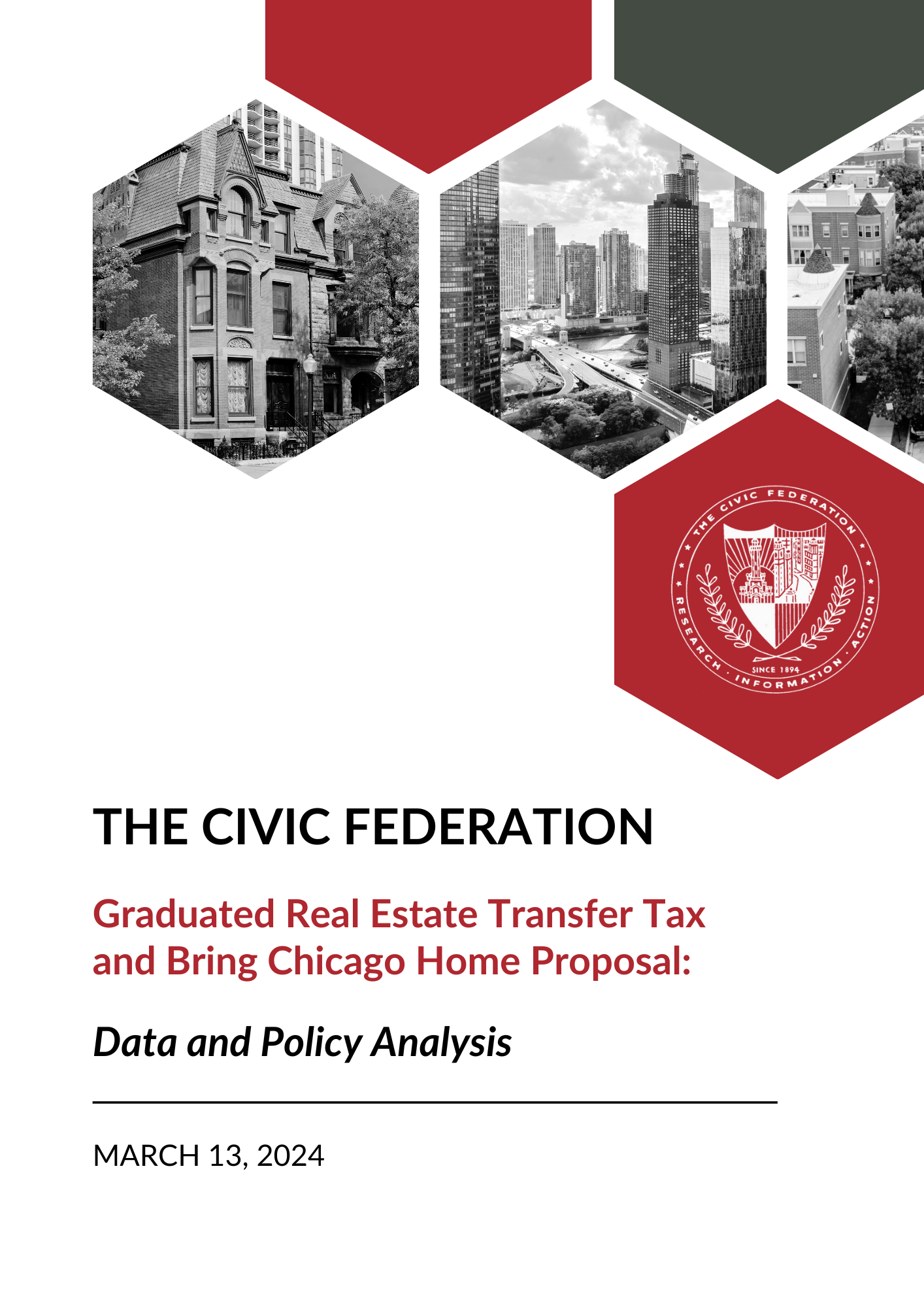March 13, 2024
Click here to read the full report.
Executive Summary
Implementing a graduated real estate transfer tax as a source of new revenue has some advantages, but it is also extremely volatile. There has not been sufficient evaluation of the proposed graduated tax’s potential impact on the City’s real estate market and economy or a public explanation as to how the changes to the tax would impact tax burden by location and property use type. Through an analysis of transfer tax data obtained from the Illinois Department of Revenue, Civic Federation staff reached the following findings, which are based on hypothetical application of the proposed marginal tax rates to historical property transactions and compared to the existing flat rate:
- The amount collected from the City’s existing real estate transfer tax (RETT) has varied from year to year depending on market conditions. There was a significant drop off in RETT proceeds in 2023 ($140.5 million) compared to 2022 ($201.4 million), a decline of 30%.
- Had the proposed graduated real estate transfer tax rates been applied to the same transactions that occurred within the 14-year period from 2010-2023, the tax would have generated an average of $128 million, or 83%, more than was generated through the existing flat rate.
- After removing several large transactions related to the Illinois Skyway that occurred in 2016 and 2022, the graduated tax would have generated an average of $117 million in additional revenue, averaged between 2010 and 2023.
- These estimates generally align with the City of Chicago’s estimates of $100 million in additional revenue per year. However, the Federation’s numbers should be read as merely a hypothetical estimate based on historical data, not a projection of future revenue.
- It is also important to recognize that it is unlikely that every transaction would have occurred in exactly the same way if the graduated income tax had been in place.
- The proposed graduated real estate transfer tax would increase the proportion of City transfer tax collected from commercial property transactions.
- Based on the existing tax rate, buyers of commercial properties paid approximately 20% of the total Chicago transfer tax on average across the 14-year period from 2010 to 2023.
- If the proposed graduated tax structure had been applied to the same transactions, commercial property transactions would have accounted for approximately 36% of total Chicago transfer taxes.
- The share paid in residential property sales would have decreased from 57% of total transfer taxes paid based on the existing rate, to 34% of total tax collections based on the graduated rate, on average, over the 14-year period.
- The portion of Chicago transfer taxes paid in commercial property transactions within the downtown central business district (consisting of the Loop, West Loop, South Loop and Near North Side) would have doubled with the graduated tax rates.
- Based on the existing flat rate, commercial property transactions in the downtown area accounted for approximately 15% of all Chicago transfer tax collections on average from 2010-2023.
- If the graduated tax structure had been applied to the same transactions, these commercial property transactions would have accounted for 28% of total Chicago transfer taxes.
As part of the Civic Federation’s evaluation of the Bring Chicago Home proposal, we sought to understand the policy implications of the tax proposal that have not been clearly publicized by the City and Mayoral administration. The questions that Federation staff submitted to City of Chicago and the information that we obtained from communications with City representatives are included in this report.
The Federation’s evaluation also included research into other cities that have enacted similar types of taxes. Researchers looked closely at Los Angeles to identify impact, lessons learned or unintended consequences. Los Angeles voters approved a measure in November 2022 to apply a graduated marginal real estate transfer tax (RETT) rate to property transactions valued at over $5 million, to be imposed in addition to an existing flat rate of 0.45%. The implementation of the tax led to a spike in property sales ahead of the effective date by property owners looking to avoid the new higher tax. Neighboring jurisdictions without the graduated RETT have the potential to become more desirable for high-end luxury real estate. Federation research found that there are problems associated with the new tax, including inconsistent application of the tax to nonprofit properties, the creation of a disincentive to build multi-family housing, and the continued availability of several tax avoidance strategies that could reduce revenue generated by the new tax. The tax was estimated to generate between $600 million and $1.1 billion annually. However, it generated only $150 million in the first eight months of implementation.
Click here to read the full report.

